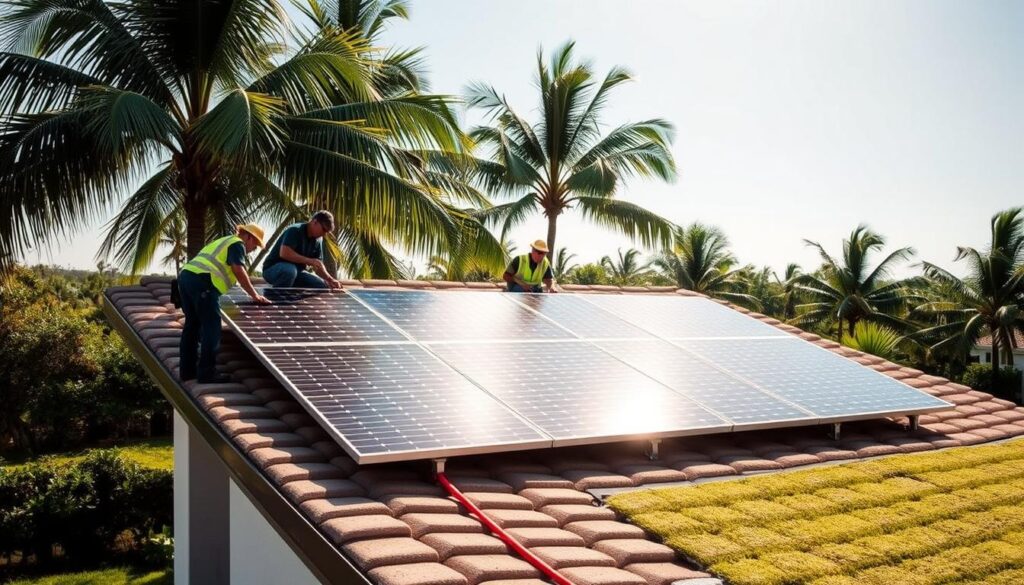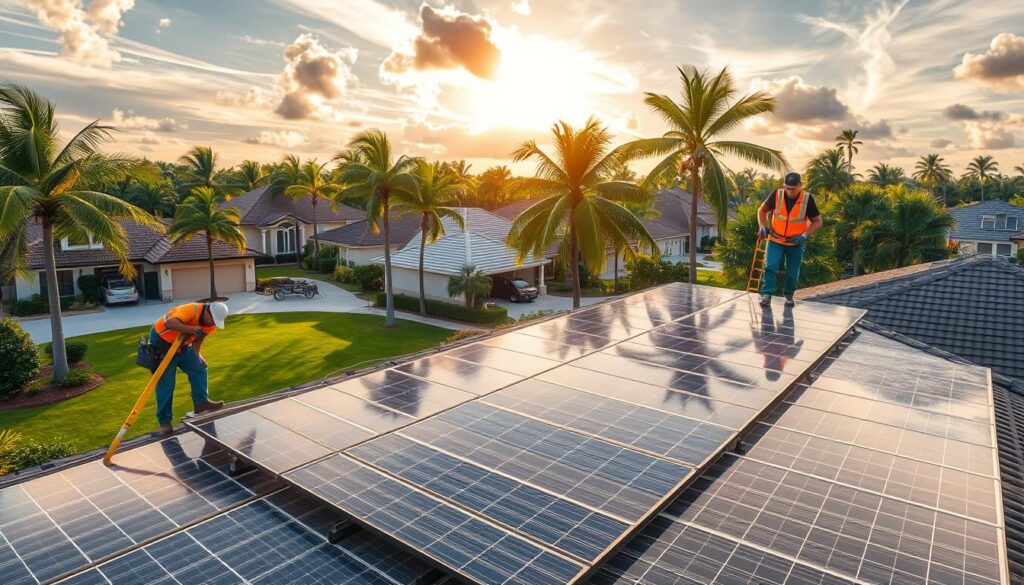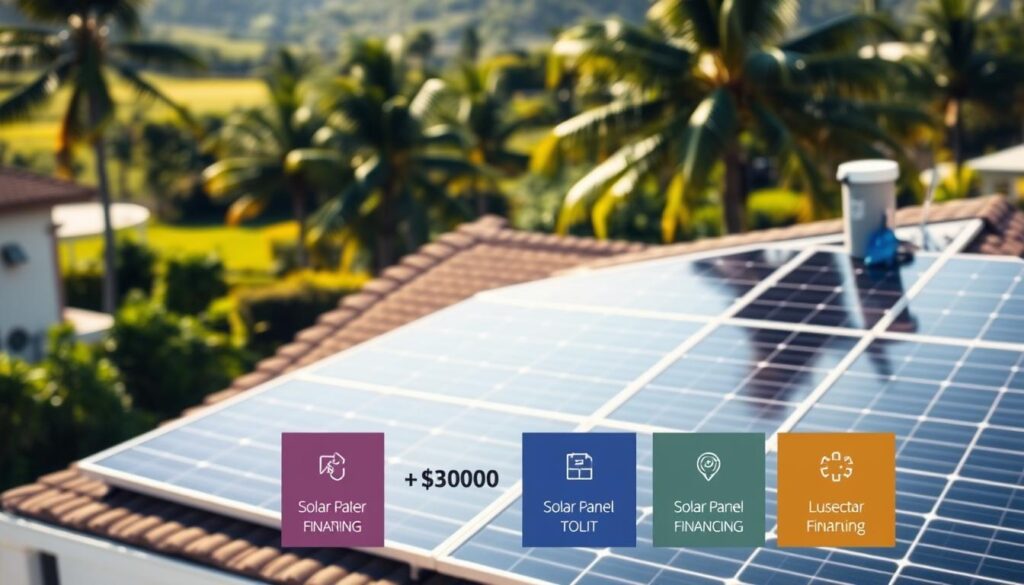Florida’s sunny climate makes it ideal for residential solar panels, but homeowners must understand how HOAs regulate installations. Since 1978, the Florida Solar Rights Act has safeguarded homeowners’ rights to install solar collectors. This guide clarifies how Florida’s laws protect your ability to use solar panels HOA Florida rules and HOA requirements.
Florida Statute 163.04 ensures HOAs cannot ban solar systems outright. While associations may set aesthetic guidelines, restrictions cannot block energy output or raise costs excessively. Solar systems are exempt from some zoning rules, giving homeowners legal backing to pursue clean energy.
Before installing, review HOA guidelines and submit plans to architectural committees. Florida’s incentives, like tax credits and net metering, make solar adoption more affordable. Clear communication with your HOA can streamline approvals, balancing community standards with renewable energy goals.
Key Takeaways
- Florida’s 1978 Solar Rights Act protects homeowners’ rights to install solar collectors.
- HOAs cannot prohibit solar panels HOA Florida residents wish to install, provided guidelines are followed.
- HOA restrictions must avoid increasing costs or reducing solar system efficiency.
- Financial incentives like tax credits reduce upfront costs for residential solar panels.
- Net metering allows homeowners to earn credits for excess energy sold to the grid.
Understanding Solar Panels and Their Benefits
Florida’s sunny climate makes it ideal for solar energy solutions that turn sunlight into electricity. Solar panels use photovoltaic cells to capture sunlight, converting it into usable power for homes. This technology offers practical advantages for residents seeking to cut costs and reduce environmental impact.
What Are Solar Panels?
Modern solar panels consist of silicon-based cells layered with protective glass. These systems typically range from 3-11 kilowatts, with most Florida homes using around 7.15 kilowatts. Key components include inverters to convert DC to AC power and mounting hardware designed to withstand hurricanes. Many brands, like SunPower and Tesla, offer warranties ensuring durability in Florida’s weather.
Environmental Impact of Solar Energy
“Solar energy reduces emissions by avoiding 3,000 pounds of CO₂ annually per average home.”
Switching to solar energy slashes reliance on fossil fuels. Since 2008, over 2 million U.S. homes have adopted solar, curbing pollution. Even broken panels pose no health risks—the EPA confirms lead and cadmium levels stay within safe limits. Solar also boosts home appeal; studies show energy-efficient homes sell 20% faster than non-updated homes.
Financial Incentives for Homeowners
- The federal Solar Investment Tax Credit (ITC) offers 26% tax savings until 2022, dropping to 22% in 2023
- Florida’s sales tax exemption saves $1,200 on a $20,000 system
- PACE financing lets homeowners pay through property taxes with no upfront costs
Homebuyers pay up to $15,000 more for solar-equipped homes. Net metering allows Floridians to earn credits for excess energy sent to the grid. Solar loans often cost less monthly than traditional utility bills, making solar panel benefits accessible even without upfront funds.
The Role of HOAs in Florida
Florida’s 40 million households in HOA communities rely on these associations to manage shared spaces and enforce rules. HOA solar panel regulations often shape how residents install renewable energy systems. Understanding their role is key to balancing community standards with modern energy needs.
What is a Homeowners Association?
Homeowners Associations (HOAs) create and enforce rules called CC&Rs (Covenants, Conditions, and Restrictions). They ensure consistency in neighborhoods, from lawn care to exterior changes. These groups impact solar panel projects by setting HOA solar panel regulations.
Common HOA Rules and Regulations
HOAs often require approval for installations, specifying placement and design. Key examples include:
- Architectural guidelines for roof colors or materials
- Approval timelines for modifications
- Maintenance requirements for shared areas
How HOAs Affect Property Values
Well-managed HOAs can boost property values by maintaining curb appeal. However, overly strict HOA solar panel regulations may limit sustainable upgrades. For example:
| State | Key Regulation | Solar Impact |
|---|---|---|
| Florida | Florida Statute 163.04 prohibits HOA bans on solar | Panels must face south within 45° |
| Colorado | Colorado Revised Statutes 38-30-168 | 10% efficiency loss maximum allowed |
| Texas | HB 362 allows aesthetic restrictions | No outright bans, but design rules apply |
Florida’s laws ensure residents can pursue solar energy while HOAs maintain standards. Next sections explore how these rules directly shape solar panel installations.
Solar Panel Regulations in Florida
Florida’s laws prioritize renewable energy options, ensuring residents can access solar power while respecting community guidelines. Understanding these rules simplifies navigating installations without legal hurdles.

State Laws Supporting Solar Energy
Florida Statute 163.04, the Solar Rights Act, safeguards homeowners. It states:
“No binding agreement may prohibit a property owner from installing solar collectors.”
This law lets homeowners install panels despite HOA rules, as long as efficiency isn’t blocked. HOAs can set locations but must allow south-facing placement (within 45° east or west). Condominiums gained similar rights via House Bill 697, letting boards install community solar systems without unit owner approval.
Permitting Requirements for Solar Installations
Before installation, secure local permits. Key steps include:
- Electrical permit from the county
- Building permit for structural changes
- Final inspection post-installation
Partnering with licensed solar panel installation services ensures compliance. They handle paperwork, aligning with local codes and solar laws. Always verify HOA guidelines first, then work with professionals to meet all requirements.
HOA Policies on Solar Panels
Florida law prohibits homeowners’ associations from forbidding solar panel installations under the Florida Solar Rights Act.
https://www.youtube.com/watch?v=H54yJI6Ql38
HOAs can set rules for solar panels but cannot block their use entirely. Here’s what homeowners in Florida need to know:
Common HOA Restrictions on Solar Installations
Many HOAs enforce these standards:
- Appearance: Panels must match roof colors or use approved materials
- Placement: Systems may require approval for visibility and location
- Safety: Installations must meet fire codes and electrical standards
- Approval: Homeowners must submit detailed plans including layout and contractor details
Exceptions and Variances in HOA Rules
| HOA Authority | Legal Limits |
|---|---|
| Set aesthetic guidelines | Cannot reduce system efficiency |
| Review placement proposals | Must allow south-facing orientation within 45° |
| Require documentation | Cannot delay approval unreasonably |
Homeowners facing disputes can request variances by proving compliance with Florida Statute 163.04. Working with solar panel installation services familiar with Florida’s laws ensures smoother approvals. The best solar panel company can provide diagrams and legal references to meet HOA requirements without sacrificing energy output. Always check local covenants for specific details.
Steps to Get HOA Approval for Solar Panels
Navigating HOA approval for residential solar panels starts with preparation. Florida law (§ 163.04) ensures you can install solar systems, but aesthetic rules may apply. Partner with licensed solar panel installation services to align designs with HOA guidelines. Follow these steps to simplify the process:

- Review HOA Documents: Study CC&Rs for solar panel placement and design rules. Note approval procedures and deadlines.
- Prepare a Detailed Proposal: Include system specs, renderings, and compliance with Florida’s solar rights law. Highlight energy savings and property value increases.
- Presentation Day Tips: Use visual aids to show how panels meet HOA standards. Stress long-term cost savings and environmental benefits.
| State | Law | HOA Limits |
|---|---|---|
| Florida | § 163.04 | Cannot ban panels; can regulate placement/aesthetics |
| California | Solar Rights Act | No outright bans, but HOAs may set design rules |
| Arizona | Statute 45-141 | HOAs must allow systems if they meet code |
Home values rise by $20 for every $1 saved annually on energy bills with solar panels.
Common concerns like roof placement or color choices can be addressed by choosing solar panel installation services offering low-profile designs. Many companies now provide custom finishes to match roofing materials. When presenting, highlight Florida’s 2023 study showing solar homes sell faster than non-solar homes in the same area.
Remember to request written approval once granted, and keep records. Most Florida boards approve proposals when they meet code and include professional renderings.
Solar Panel Aesthetics and HOA Concerns
Modern solar energy solutions address HOA design rules while maintaining energy efficiency. Florida law ensures residential solar panels can’t be banned, but HOAs may set guidelines on placement or color. Here’s how to meet both goals:
Design Considerations for Compliance
Choose styles that blend with roofing materials. Options include:
| Design Type | Appearance | HOA Benefits |
|---|---|---|
| All-Black Panels | Uniform black frames and cells | Matches shingle roofs, minimizes visual impact |
| Roof-Integrated Tiles | Blend with tile or slate roofs | Reduces “add-on” look common in HOA complaints |
| Low-Profile Mounts | Lies flush with rooflines | Avoids protruding angles that HOAs often reject |
Finding Harmonious Solutions with Your HOA
Start with these steps to align with HOA rules:
- Use south-facing roofs to maximize sunlight without street visibility
- Select panels with color-matched frames to roofs or siding
- Propose screening options for ground-mounted systems
Florida’s laws require HOAs to allow residential solar panels if they meet basic design rules. Work with installers who know local HOA guidelines to ensure compliance upfront. Compromises like partial shading or color choices often resolve most disputes without legal action.
The Benefits of Working with Solar Companies
Partnering with the best solar panel company streamlines the process of installing solar panels while addressing HOA requirements. These experts ensure compliance with local regulations and offer solar panel financing options tailored to your budget. Their expertise helps avoid costly mistakes, ensuring systems are both efficient and aesthetically acceptable to your community.

How to Choose a Reputable Installer
- Verify Florida licensing and experience with HOA-compliant installations.
- Check reviews and ask for references from past HOA projects.
- Confirm familiarity with state laws like Florida Statute 163.04, which mandates HOA approval for south-facing panels.
HOA communities like North Rim in San Diego saved up to $18,000 annually by working with certified installers.
Partnering with Local Solar Firms
Local companies understand Florida’s climate and HOA aesthetics. They assist with permits, design panels to meet HOA guidelines, and provide solar panel financing options like leases or payment plans. Their knowledge of regional regulations ensures smoother approval processes and minimizes disputes over placement or design.
Dispute Resolution with HOAs
Conflicts over HOA solar panel regulations in Florida can arise even with proper planning. Florida Statute 163.04 ensures homeowners can install solar panels, but misunderstandings happen. Start by reviewing the law and your HOA’s rules. Open dialogue with your board using facts like Florida’s mandate against HOA prohibitions on solar energy systems.
Effective Strategies for Addressing Conflicts
- Solar panels HOA Florida rights begin with education. Share Florida’s statutes and environmental benefits during meetings.
- Mediation resolves many disputes faster than court battles. Florida courts often require mediation first.
- Document all communications to build a clear record for negotiations or legal review.
Legal Resources and Support
Legal aid is available if talks stall. The Solar United Neighbors of Florida provides community support. Consult HOA specialists to navigate Chapter 720 requirements. If challenged, cite the Fifth DCA ruling in Del Marco, which affirmed homeowners’ rights without proving “hardship.”
“Florida law prohibits HOAs from banning solar installations outright.”
Attorneys can help draft compliant proposals or challenge HOA policies violating state law. Prioritize collaboration first, but know legal options exist to protect your investment in renewable energy.
Community Support for Solar Initiatives
Building community support can turn individual solar projects into neighborhood-wide renewable energy options. Start by sharing how solar panel benefits like lower utility bills and disaster resilience align with Florida’s sunny climate and hurricane risks. Use local examples, like solar-powered streetlights or shared solar gardens, to show collective value.
Engaging Neighbors in Your Solar Project
- Host neighborhood workshops with solar installers to address concerns
- Share case studies of nearby homes saving 20-30% on energy bills
- Create a community solar map showing ideal installation zones
Building Awareness About Solar Benefits
Clarify myths by highlighting:
- Florida Statute 163.04 allows panels facing south for optimal efficiency
- Modern systems need only annual maintenance
- HOAs can’t require costly design changes without efficiency proof
| Initiative | Impact |
|---|---|
| Solar streetlights | Reduces common area electricity costs |
| Community solar gardens | Shares costs among residents |
| Solar easements | Protects sunlight access for all homes |
Florida’s 40 million HOA-governed households can drive change. By highlighting how solar aligns with state laws and disaster preparedness, neighbors gain confidence to join. Start small—like a shared newsletter showcasing solar panel benefits—to build momentum.
Future of Solar Energy and HOAs in Florida
Florida’s solar energy landscape is shifting as more communities embrace renewable solutions. Innovations like solar tiles and building-integrated photovoltaics (BIPV) are making solar panels blend seamlessly into homes. Solar panel financing options, such as tax credits and loans, are also expanding access. These trends signal a brighter, greener path for homeowners.
Trends in Solar Energy Adoption
Communities like Babcock Ranch, powered by an 880-acre solar field, show how solar energy solutions can redefine neighborhoods. Over 33% of global electricity could come from renewables by 2024, with solar accounting for 60% of that growth. Florida homeowners save $20,000 to $97,000 over a solar panel’s lifetime, and tax credits cover 30% of installation costs. Advances in battery storage further boost resilience in hurricane-prone regions, ensuring power during outages.
The Evolving Role of HOAs in Renewable Energy
HOAs are updating rules to align with Florida’s Solar Rights Act and 2023’s House Bill 437, which expanded solar access rights. By revising CC&Rs, associations balance aesthetics with sustainability. For instance, Babcock Ranch’s climate-adaptive design includes solar panels and flood-resistant Smart Ponds. As demand grows, HOAs increasingly view solar installations as value-boosting assets rather than obstacles. This forward motion ensures Florida’s HOAs and homeowners can build a cleaner, more resilient energy future together.
